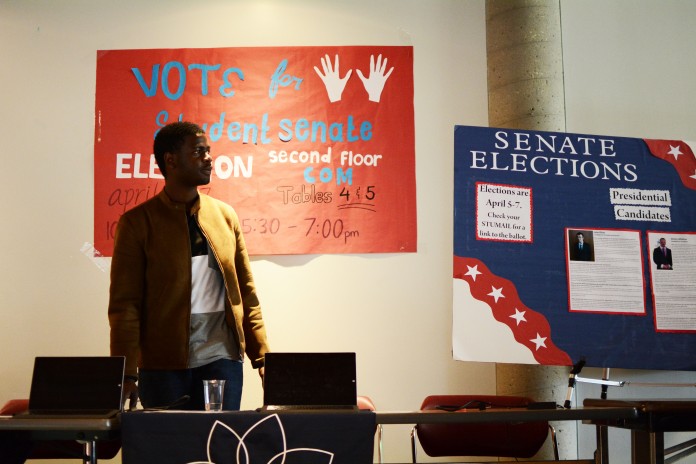
by Aaron Rhodes
Staff reporter

Student Senate elections are April 5 through April 7 and are held via a ballot emailed to all students at the college. Winning candidates will be announced shortly after. Becoming a part of Student Senate is easier than students might think.
“If somebody is interested in joining Senate right now as a senator, they just need to go to two meetings in a row — we meet every Monday at noon in RC220 — and then they have [a] packet … that they need to fill out and get signatures from 10 students, and then at that second meeting they are voted in by the Senate,” Mindy Kinnaman, manager of student life and leadership development, said. “They give a short presentation about why they want to join [and] the Senate will ask them some questions. Typically the questions are what issues they see facing the campus, what committees they’re interested in serving on [and] what they want to accomplish.”
Chris Roesel is one of the Senate’s 25 members and an avid participant at Senate meetings. Roesel said he joined the Senate to make a difference and keep the Senate’s agenda focused on what is important to the students.
“The government is doing very big things that affect us,” said Roesel. “There are things like whether there’s free tuition, whether tuition goes up. The governor just removed $17 million from the higher education budget a couple weeks ago, and I think he did that because students don’t vote, so who cares? Another is guns on campus, another is … whether people can get easy access to reproductive health care. Those are concerns of students. Those aren’t concerns for people who are over 60 years of age.”
Roesel believes that while the Senate often does important work, they should be more ambitious with their goals.
“The main concerns with me about the students is that for whatever reason it’s focusing on the budget for these different clubs and it’s not comfortable in addressing bigger overarching concerns. So some of the concerns it is addressing is return-book policies, selling books back to the bookstore and a student rest center so you can go in and lie down. I think there are bigger concerns than that for the students of Johnson County Community College.”
The college’s Board of Trustees chairman Greg Musil also weighed in on the role of the Student Senate on the Board’s decisions.
“In my five-plus years on the Board, we have tried to pay special attention to listening to and hearing the concerns and voices of students,” said Musil. “That formal voice is the Student Senate, and we do care about the Senate’s perspective on the state of the college and the students’ experience. As with other stakeholder groups, we recognize the Student Senate isn’t the only student voice, but it has a place on each month’s Board agenda at our meetings and that indicates the Student Senate is an important voice. An example of the type of collaboration and listening the Board and the administration try to do with Student Senate was the Town Hall meeting on campus safety and security last fall.”
While not everyone at the college agrees on how important the Student Senate is, they are responsible for many financial decisions that affect the lives of nearly all of its students.
Election information will be sent to student email addresses on April 5.





















